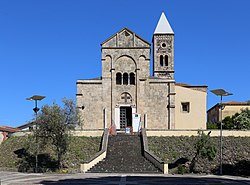Santa Giusta
 From Wikipedia the free encyclopedia
From Wikipedia the free encyclopedia
Santa Giusta Santa Justa | |
|---|---|
| Comune di Santa Giusta | |
 view of Santa Giusta Cathedral | |
| Coordinates: 39°53′N 8°37′E / 39.883°N 8.617°E | |
| Country | Italy |
| Region | Sardinia |
| Province | Oristano (OR) |
| Frazioni | Cirras, Corte Baccas |
| Government | |
| • Mayor | Antonello Figus |
| Area | |
| • Total | 69.2 km2 (26.7 sq mi) |
| Population (30 November 2014)[2] | |
| • Total | 4,875 |
| • Density | 70/km2 (180/sq mi) |
| Demonym(s) | Santagiustesi Santajustesus |
| Time zone | UTC+1 (CET) |
| • Summer (DST) | UTC+2 (CEST) |
| Postal code | 09096 |
| Dialing code | 0783 |
| Patron saint | Santa Giusta |
| Website | Official website |
Santa Giusta (Italian pronunciation: [ˈsanta ˈdʒusta]; Sardinian: Santa Justa) is a comune (municipality) in the Province of Oristano in the Italian region of Sardinia, located about 90 kilometres (56 miles) northwest of Cagliari and about 3 km (2 mi) southeast of Oristano in the Campidano area.
History
[edit]The site of the Phoenician port town of Othoca[3] is thought to be at the bottom of a lake separated from the Mediterranean by a small isthmus, and modern Santa Giusta occupies some ancient sites. Previous excavations recovered 50 amphorae and the first chamber tomb of Phoenician origin found in Italy. Archaeologists led by Carlo del Vais of the University of Cagliari plan to excavate a portion of the lake where 100 amphorae appear to be located on a wooden platform covered by a thick mud layer.[4]
Main sights
[edit]- Santa Giusta Cathedral, former cathedral and now a minor basilica, an important Romanesque church
References
[edit]- ^ "Superficie di Comuni Province e Regioni italiane al 9 ottobre 2011". Italian National Institute of Statistics. Retrieved 16 March 2019.
- ^ All demographics and other statistics: National Institute of Statistics (Italy) (Istat).
- ^ Richard Talbert, Barrington Atlas of the Greek and Roman World, (ISBN 0-691-03169-X), Map 48.
- ^ "Excavation planned for Phoenician city." United Press International, 18 Aug. 2007. [1]




